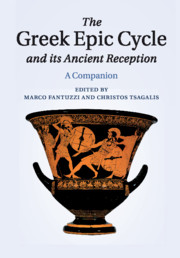Book contents
- Frontmatter
- Contents
- List of illustrations
- List of contributors
- Editorial note
- Introduction: Kyklos, the Epic Cycle and Cyclic poetry
- PART I APPROACHES TO THE EPIC CYCLE
- 1 Coming adrift: The limits of reconstruction of the cyclic poems
- 2 Oral traditions, written texts, and questions of authorship
- 3 The Epic Cycle and oral tradition
- 4 The formation of the Epic Cycle
- 5 Motif and source research: Neoanalysis, Homer, and Cyclic epic
- 6 Meta-Cyclic epic and Homeric poetry
- 7 Language and meter of the Epic Cycle
- 8 Narrative techniques in the Epic Cycle
- 9 Wit and irony in the Epic Cycle
- 10 The Trojan War in early Greek art
- PART II EPICS
- PART III THE FORTUNE OF THE EPIC CYCLE IN THE ANCIENT WORLD
- Works cited
- Index of principal passages
- Index nominum et rerum
9 - Wit and irony in the Epic Cycle
from PART I - APPROACHES TO THE EPIC CYCLE
Published online by Cambridge University Press: 05 August 2015
- Frontmatter
- Contents
- List of illustrations
- List of contributors
- Editorial note
- Introduction: Kyklos, the Epic Cycle and Cyclic poetry
- PART I APPROACHES TO THE EPIC CYCLE
- 1 Coming adrift: The limits of reconstruction of the cyclic poems
- 2 Oral traditions, written texts, and questions of authorship
- 3 The Epic Cycle and oral tradition
- 4 The formation of the Epic Cycle
- 5 Motif and source research: Neoanalysis, Homer, and Cyclic epic
- 6 Meta-Cyclic epic and Homeric poetry
- 7 Language and meter of the Epic Cycle
- 8 Narrative techniques in the Epic Cycle
- 9 Wit and irony in the Epic Cycle
- 10 The Trojan War in early Greek art
- PART II EPICS
- PART III THE FORTUNE OF THE EPIC CYCLE IN THE ANCIENT WORLD
- Works cited
- Index of principal passages
- Index nominum et rerum
Summary
Introduction
There are two major obstacles to detecting humor in the Epic Cycle. The first is the fragmentary condition of the texts, supplemented by dry summaries that surely flatten out any flashes of wit. This we cannot remedy. The second is the abiding sense that these are inferior poems, or at best products of an oral tradition to which so individual an element as humor is foreign. The dates of various poems in the Cycle have been much discussed, and they are not uniformly regarded nowadays as necessarily post-Homeric. Moreover, scholars have observed that the difference in quality that we perceive between them and the Homeric epics may well reflect a later aesthetic such as Aristotle's, who preferred the Iliad and the Odyssey because their unitary plots resembled those of tragedy, which was for him the model genre. Still and all, I have not come across a discussion of the Cycle in which anyone has referred to the Monumental Poet of the Cypria, for example, or of the Aethiopis; even those who are inclined to accept ancient attributions of the Cypria to Stasinus or Hegesias or Cyprias, or of the Aethiopis to Arctinus, rarely if ever put these shadowy figures in the same class as the equally shadowy Homer when it comes to subtlety and originality.
In what follows, I am going to assume, for my argument's sake, that the Cypria and other poems in the Cycle were every bit as sophisticated as the Odyssey, and see whether, on such a reading, there are signs of humor in what survives – I had almost said ‘deliberate humor,’ but then, humor is by nature intentional; I am not referring to lapses of taste that we might find funny but are not the product of authorial wit. For humor, as we know, is entirely at home in epic, often in the form of innuendos that slyly undercut the heroic ethos – and these are perhaps the most difficult to spot. By way of preface, let me offer one such example in the Odyssey that I think has not been previously appreciated, and may suggest ways of interpreting some of the apparently outlandish bits in the Cyclic poems.
- Type
- Chapter
- Information
- The Greek Epic Cycle and its Ancient ReceptionA Companion, pp. 164 - 177Publisher: Cambridge University PressPrint publication year: 2015



